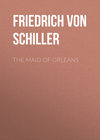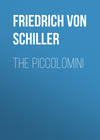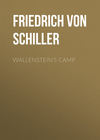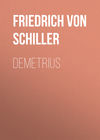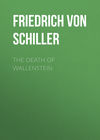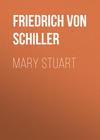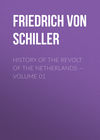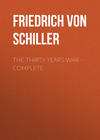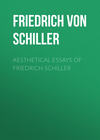Read the book: «The Maid of Orleans»
DRAMATIS PERSONAE
CHARLES THE SEVENTH, King of France.
QUEEN ISABEL, his Mother.
AGNES SOREL.
PHILIP THE GOOD, Duke of Burgundy.
EARL DUNOIS, Bastard of Orleans.
LA HIRE, DUCRATEL, French Offers.
ARCHBISHOP OF RHEIMS.
CRATILLON, A Burgundian Knight.
RAOUL, a Lotharingian Knight.
TALBOT, the English General,
LIONEL, FASTOLFE, English Officers.
MONTGOMERY, a Welshman.
COUNCILLORS OF ORLEANS.
AN ENGLISH HERALD.
THIBAUT D'ARC, a wealthy Countryman.
MARGOT, LOUISON, JOHANNA, his Daughters.
ETIENNE, CLAUDE MARIE, RAIMOND, their Suitors.
BERTRAND, another Countryman.
APPARITION OF A BLACK KNIGHT.
CHARCOAL-BURNER AND HIS WIFE.
Soldiers and People, Officers of the Crown, Bishops, Monks, Marshals, Magistrates, Courtiers, and other mute persons in the Coronation Procession.
PROLOGUE
A rural District. To the right, a Chapel with an Image of the Virgin; to the left, an ancient Oak.
SCENE I
THIBAUT D'ARC. His Three Daughters. Three young Shepherds, their Suitors.
THIBAUT
Ay, my good neighbors! we at least to-day
Are Frenchmen still, free citizens and lords
Of the old soil which our forefathers tilled.
Who knows whom we to-morrow must obey?
For England her triumphal banner waves
From every wall: the blooming fields of France
Are trampled down beneath her chargers' hoofs;
Paris hath yielded to her conquering arms,
And with the ancient crown of Dagobert
Adorns the scion of a foreign race.
Our king's descendant, disinherited,
Must steal in secret through his own domain;
While his first peer and nearest relative
Contends against him in the hostile ranks;
Ay, his unnatural mother leads them on.
Around us towns and peaceful hamlets burn.
Near and more near the devastating fire
Rolls toward these vales, which yet repose in peace.
Therefore, good neighbors, I have now resolved,
While God still grants us safety, to provide
For my three daughters; for 'midst war's alarms
Women require protection, and true love
Hath power to render lighter every load.
[To the first Shepherd.
Come, Etienne! You seek my Margot's hand.
Fields lying side by side and loving hearts
Promise a happy union!
[To the second.
Claude! You're silent,
And my Louison looks upon the ground?
How, shall I separate two loving hearts
Because you have no wealth to offer me?
Who now has wealth? Our barns and homes afford
Spoil to the foe, and fuel to the fires.
In times like these a husband's faithful breast
Affords the only shelter from the storm.
LOUISON
My father!
CLAUDE MARIE
My Louison!
LOUISON (embracing JOHANNA)
My dear sister!
THIBAUT
I give to each a yard, a stall and herd,
And also thirty acres; and as God
Gave me his blessing, so I give you mine!
MARGOT (embracing JOHANNA)
Gladden our father – follow our example!
Let this day see three unions ratified!
THIBAUT
Now go; make all things ready; for the morn
Shall see the wedding. Let our village friends
Be all assembled for the festival.
[The two couples retire arm in arm.
SCENE II
THIBAUT, RAIMOND, JOHANNA.
THIBAUT
Thy sisters, Joan, will soon be happy brides;
I see them gladly; they rejoice my age;
But thou, my youngest, giv'st me grief and pain.
RAIMOND
What is the matter? Why upbraid thy child?
THIBAUT
Here is this noble youth, the flower and pride
Of all our village; he hath fixed on thee
His fond affections, and for three long years
Has wooed thee with respectful tenderness;
But thou dost thrust him back with cold reserve.
Nor is there one 'mong all our shepherd youths
Who e'er can win a gracious smile from thee.
I see thee blooming in thy youthful prime;
Thy spring it is, the joyous time of hope;
Thy person, like a tender flower, hath now
Disclosed its beauty, but I vainly wait
For love's sweet blossom genially to blow,
And ripen joyously to golden fruit!
Oh, that must ever grieve me, and betrays
Some sad deficiency in nature's work!
The heart I like not which, severe and cold,
Expands not in the genial years of youth.
RAIMOND
Forbear, good father! Cease to urge her thus!
A noble, tender fruit of heavenly growth
Is my Johanna's love, and time alone
Bringeth the costly to maturity!
Still she delights to range among the hills,
And fears descending from the wild, free heath,
To tarry 'neath the lowly roofs of men,
Where dwell the narrow cares of humble life.
From the deep vale, with silent wonder, oft
I mark her, when, upon a lofty hill
Surrounded by her flock, erect she stands,
With noble port, and bends her earnest gaze
Down on the small domains of earth. To me
She looketh then, as if from other times
She came, foreboding things of import high.
THIBAUT
'Tis that precisely which displeases me!
She shuns her sisters' gay companionship;
Seeks out the desert mountains, leaves her couch
Before the crowing of the morning cock,
And in the dreadful hour, when men are wont
Confidingly to seek their fellow-men,
She, like the solitary bird, creeps forth,
And in the fearful spirit-realm of night,
To yon crossway repairs, and there alone
Holds secret commune with the mountain wind.
Wherefore this place precisely doth she choose?
Why hither always doth she drive her flock?
For hours together I have seen her sit
In dreamy musing 'neath the Druid tree,
Which every happy creature shuns with awe.
For 'tis not holy there; an evil spirit
Hath since the fearful pagan days of old
Beneath its branches fixed his dread abode.
The oldest of our villagers relate
Strange tales of horror of the Druid tree;
Mysterious voices of unearthly sound
From its unhallowed shade oft meet the ear.
Myself, when in the gloomy twilight hour
My path once chanced to lead me near this tree,
Beheld a spectral figure sitting there,
Which slowly from its long and ample robe
Stretched forth its withered hand, and beckoned me.
But on I went with speed, nor looked behind,
And to the care of God consigned my soul.
RAIMOND (pointing to the image of the Virgin)
Yon holy image of the Virgin blest,
Whose presence heavenly peace diffuseth round,
Not Satan's work, leadeth thy daughter here.
THIBAUT
No! not in vain hath it in fearful dreams
And apparitions strange revealed itself.
For three successive nights I have beheld
Johanna sitting on the throne at Rheims,
A sparkling diadem of seven stars
Upon her brow, the sceptre in her hand,
From which three lilies sprung, and I, her sire,
With her two sisters, and the noble peers,
The earls, archbishops, and the king himself,
Bowed down before her. In my humble home
How could this splendor enter my poor brain?
Oh, 'tis the prelude to some fearful fall!
This warning dream, in pictured show, reveals
The vain and sinful longing of her heart.
She looks with shame upon her lowly birth.
Because with richer beauty God hath graced
Her form, and dowered her with wondrous gifts
Above the other maidens of this vale,
She in her heart indulges sinful pride,
And pride it is through which the angels fell,
By which the fiend of hell seduces man.
RAIMOND
Who cherishes a purer, humbler mind
Than doth thy pious daughter? Does she not
With cheerful spirit work her sisters' will?
She is more highly gifted far than they,
Yet, like a servant maiden, it is she
Who silently performs the humblest tasks.
Beneath her guiding hands prosperity
Attendeth still thy harvest and thy flocks;
And around all she does there ceaseless flows
A blessing, rare and unaccountable.
THIBAUT
Ah truly! Unaccountable indeed!
Sad horror at this blessing seizes me!
But now no more; henceforth I will be silent.
Shall I accuse my own beloved child?
I can do naught but warn and pray for her.
Yet warn I must. Oh, shun the Druid tree!
Stay not alone, and in the midnight hour
Break not the ground for roots, no drinks prepare,
No characters inscribe upon the sand!
'Tis easy to unlock the realm of spirits;
Listening each sound, beneath a film of earth
They lay in wait, ready to rush aloft.
Stay not alone, for in the wilderness
The prince of darkness tempted e'en the Lord.
SCENE III
THIBAUT, RAIMOND, JOHANNA.
BERTRAND enters, a helmet in his hand.
RAIMOND
Hush! here is Bertrand coming back from town;
What bears he in his hand?
BERTRAND
You look at me
With wondering gaze; no doubt you are surprised
To see this martial helm!
THIBAUT
We are indeed!
Come, tell us how you come by it? Why bring
This fearful omen to our peaceful vale?
[JOHANNA, who has remained indifferent during the two previous scenes, becomes attentive, and steps nearer.
BERTRAND
I scarce can tell you how I came by it.
I had procured some tools at Vaucouleurs;
A crowd was gathered in the market-place,
For fugitives were just arrived in haste
From Orleans, bringing most disastrous news.
In tumult all the town together flocked,
And as I forced a passage through the crowds,
A brown Bohemian woman, with this helm,
Approached me, eyed me narrowly, and said:
"Fellow, you seek a helm; I know it well.
Take this one! For a trifle it is yours."
"Go with it to the soldiers," I replied,
"I am a husbandman, and want no helm."
She would not cease, however, and went on:
"None knoweth if he may not want a helm.
A roof of metal for the Head just now
Is of more value than a house of stone."
Thus she pursued me closely through the streets,
Still offering the helm, which I refused.
I marked it well, and saw that it was bright,
And fair and worthy of a knightly head;
And when in doubt I weighed it in my hand,
The strangeness of the incident revolving,
The woman disappeared, for suddenly
The rushing crowd had carried her away.
And I was left the helmet in my hand.
JOHANNA (attempting eagerly to seize it)
Give me the helmet!
BERTRAND
Why, what boots it you?
It is not suited to a maiden's head.
JOHANNA (seizing it from him)
Mine is the helmet – it belongs to me!
THIBAUT
What whim is this?
RAIMOND
Nay, let her have her way!
This warlike ornament becomes her well,
For in her bosom beats a manly heart.
Remember how she once subdued the wolf,
The savage monster which destroyed our herds,
And filled the neighb'ring shepherds with dismay.
She all alone – the lion-hearted maid
Fought with the wolf, and from him snatched the lamb
Which he was bearing in his bloody jaws.
How brave soe'er the head this helm adorned,
It cannot grace a worthier one than hers!
THIBAUT (to BERTRAND)
Relate what new disasters have occurred.
What tidings brought the fugitives?
BERTRAND
May God
Have pity on our land, and save the king!
In two great battles we have lost the day;
Our foes are stationed in the heart of France,
Far as the river Loire our lands are theirs —
Now their whole force they have combined, and lay
Close siege to Orleans.
THIBAUT
God protect the king!
BERTRAND
Artillery is brought from every side,
And as the dusky squadrons of the bees
Swarm round the hive upon a summer day,
As clouds of locusts from the sultry air
Descend and shroud the country round for miles,
So doth the cloud of war, o'er Orleans' fields,
Pour forth its many-nationed multitudes,
Whose varied speech, in wild confusion blent,
With strange and hollow murmurs fill the air.
For Burgundy, the mighty potentate,
Conducts his motley host; the Hennegarians,
The men of Liege and of Luxemburg,
The people of Namur, and those who dwell
In fair Brabant; the wealthy men of Ghent,
Who boast their velvets, and their costly silks;
The Zealanders, whose cleanly towns appear
Emerging from the ocean; Hollanders
Who milk the lowing herds; men from Utrecht,
And even from West Friesland's distant realm,
Who look towards the ice-pole – all combine,
Beneath the banner of the powerful duke,
Together to accomplish Orleans' fall.
THIBAUT
Oh, the unblest, the lamentable strife,
Which turns the arms of France against itself!
BERTRAND
E'en she, the mother-queen, proud Isabel
Bavaria's haughty princess – may be seen,
Arrayed in armor, riding through the camp;
With poisonous words of irony she fires
The hostile troops to fury 'gainst her son,
Whom she hath clasped to her maternal breast.
THIBAUT
A curse upon her, and may God prepare
For her a death like haughty Jezebel's!
BERTRAND
The fearful Salisbury conducts the siege,
The town-destroyer; with him Lionel,
The brother of the lion; Talbot, too,
Who, with his murd'rous weapon, moweth down
The people in the battle: they have sworn,
With ruthless insolence to doom to shame
The hapless maidens, and to sacrifice
All who the sword have wielded, with the sword.
Four lofty watch-towers, to o'ertop the town,
They have upreared; Earl Salisbury from on high
Casteth abroad his cruel, murd'rous glance,
And marks the rapid wanderers in the streets.
Thousands of cannon-balls, of pond'rous weight,
Are hurled into the city. Churches lie
In ruined heaps, and Notre Dame's royal tower
Begins at length to bow its lofty head.
They also have formed powder-vaults below,
And thus, above a subterranean hell,
The timid city every hour expects,
'Midst crashing thunder, to break forth in flames.
[JOHANNA listens with close attention, and places the helmet on her head.
THIBAUT
But where were then our heroes? Where the swords
Of Saintrailles, and La Hire, and brave Dunois,
Of France the bulwark, that the haughty foe
With such impetuous force thus onward rushed?
Where is the king? Can he supinely see
His kingdom's peril and his cities' fall?
BERTRAND
The king at Chinon holds his court; he lacks
Soldiers to keep the field. Of what avail
The leader's courage, and the hero's arm,
When pallid fear doth paralyze the host?
A sudden panic, as if sent from God,
Unnerves the courage of the bravest men.
In vain the summons of the king resounds
As when the howling of the wolf is heard,
The sheep in terror gather side by side,
So Frenchmen, careless of their ancient fame,
Seek only now the shelter of the towns.
One knight alone, I have been told, has brought
A feeble company, and joins the king
With sixteen banners.
JOHANNA (quickly)
What's the hero's name?
BERTRAND
'Tis Baudricour. But much I fear the knight
Will not be able to elude the foe,
Who track him closely with too numerous hosts.
JOHANNA
Where halts the knight? Pray tell me, if you know.
BERTRAND
About a one day's march from Vaucouleurs.
THIBAUT (to JOHANNA)
Why, what is that to thee? Thou dost inquire
Concerning matters which become thee not.
BERTRAND
The foe being now so strong, and from the king
No safety to be hoped, at Vaucouleurs
They have with unanimity resolved
To yield them to the Duke of Burgundy.
Thus we avoid the foreign yoke, and still
Continue by our ancient royal line;
Ay, to the ancient crown we may fall back
Should France and Burgundy be reconciled.
JOHANNA (as if inspired)
Speak not of treaty! Speak not of surrender!
The savior comes, he arms him for the fight.
The fortunes of the foe before the walls
Of Orleans shall be wrecked! His hour is come,
He now is ready for the reaper's hand,
And with her sickle will the maid appear,
And mow to earth the harvest of his pride.
She from the heavens will tear his glory down,
Which he had hung aloft among the stars;
Despair not! Fly not! for ere yonder corn
Assumes its golden hue, or ere the moon
Displays her perfect orb, no English horse
Shall drink the rolling waters of the Loire.
BERTRAND
Alas! no miracle will happen now!
JOHANNA
Yes, there shall yet be one – a snow-white dove
Shall fly, and with the eagle's boldness, tear
The birds of prey which rend her fatherland.
She shall o'erthrow this haughty Burgundy,
Betrayer of the kingdom; Talbot, too,
The hundred-handed, heaven-defying scourge;
This Salisbury, who violates our fanes,
And all these island robbers shall she drive
Before her like a flock of timid lambs.
The Lord will be with her, the God of battle;
A weak and trembling creature he will choose,
And through a tender maid proclaim his power,
For he is the Almighty!
THIBAULT
What strange power
Hath seized the maiden?
RAIMOND
Doubtless 'tis the helmet
Which doth inspire her with such martial thoughts.
Look at your daughter. Mark her flashing eye,
Her glowing cheek, which kindles as with fire.
JOHANNA
This realm shall fall! This ancient land of fame,
The fairest that, in his majestic course,
The eternal sun surveys – this paradise,
Which, as the apple of his eye, God loves —
Endure the fetters of a foreign yoke?
Here were the heathen scattered, and the cross
And holy image first were planted here;
Here rest St. Louis' ashes, and from hence
The troops went forth who set Jerusalem free.
BERTRAND (in astonishment)
Hark how she speaks! Why, whence can she obtain
This glorious revelation? Father Arc!
A wondrous daughter God hath given you!
JOHANNA
We shall no longer serve a native prince!
The king, who never dies, shall pass away —
The guardian of the sacred plough, who fills
The earth with plenty, who protects our herds,
Who frees the bondmen from captivity,
Who gathers all his cities round his throne —
Who aids the helpless, and appals the base,
Who envies no one, for he reigns supreme;
Who is a mortal, yet an angel too,
Dispensing mercy on the hostile earth.
For the king's throne, which glitters o'er with gold,
Affords a shelter for the destitute;
Power and compassion meet together there,
The guilty tremble, but the just draw near,
And with the guardian lion fearless sport!
The stranger king, who cometh from afar,
Whose fathers' sacred ashes do not lie
Interred among us; can he love our land?
Who was not young among our youth, whose heart
Respondeth not to our familiar words,
Can he be as a father to our sons?
THIBAUT
God save the king and France! We're peaceful folk,
Who neither wield the sword, nor rein the steed.
– Let us await the king whom victory crowns;
The fate of battle is the voice of God.
He is our lord who crowns himself at Rheims,
And on his head receives the holy oil.
– Come, now to work! come! and let every one
Think only of the duty of the hour!
Let the earth's great ones for the earth contend,
Untroubled we may view the desolation,
For steadfast stand the acres which we till.
The flames consume our villages, our corn
Is trampled 'neath the tread of warlike steeds;
With the new spring new harvests reappear,
And our light huts are quickly reared again!
[They all retire except the maiden.
SCENE IV
JOHANNA (alone)
Farewell ye mountains, ye beloved glades,
Ye lone and peaceful valleys, fare ye well!
Through you Johanna never more may stray!
For, ay, Johanna bids you now farewell.
Ye meads which I have watered, and ye trees
Which I have planted, still in beauty bloom!
Farewell ye grottos, and ye crystal springs!
Sweet echo, vocal spirit of the vale.
Who sang'st responsive to my simple strain,
Johanna goes, and ne'er returns again.
Ye scenes where all my tranquil joys
I knew, Forever now I leave you far behind!
Poor foldless lambs, no shepherd now have you!
O'er the wide heath stray henceforth unconfined!
For I to danger's field, of crimson hue,
Am summoned hence another flock to find.
Such is to me the spirit's high behest;
No earthly, vain ambition fires my breast.
For who in glory did on Horeb's height
Descend to Moses in the bush of flame,
And bade him go and stand in Pharaoh's sight —
Who once to Israel's pious shepherd came,
And sent him forth, his champion in the fight, —
Who aye hath loved the lowly shepherd train, —
He, from these leafy boughs, thus spake to me,
"Go forth! Thou shalt on earth my witness be.
"Thou in rude armor must thy limbs invest,
A plate of steel upon thy bosom wear;
Vain earthly love may never stir thy breast,
Nor passion's sinful glow be kindled there.
Ne'er with the bride-wreath shall thy locks be dressed,
Nor on thy bosom bloom an infant fair;
But war's triumphant glory shall be thine;
Thy martial fame all women's shall outshine.
"For when in fight the stoutest hearts despair,
When direful ruin threatens France, forlorn,
Then thou aloft my oriflamme shalt bear,
And swiftly as the reaper mows the corn,
Thou shalt lay low the haughty conqueror;
His fortune's wheel thou rapidly shalt turn,
To Gaul's heroic sons deliverance bring,
Relieve beleaguered Rheims, and crown thy king!"
The heavenly spirit promised me a sign;
He sends the helmet, it hath come from him.
Its iron filleth me with strength divine,
I feel the courage of the cherubim;
As with the rushing of a mighty wind
It drives me forth to join the battles din;
The clanging trumpets sound, the chargers rear,
And the loud war-cry thunders in mine ear.
[She goes out.
